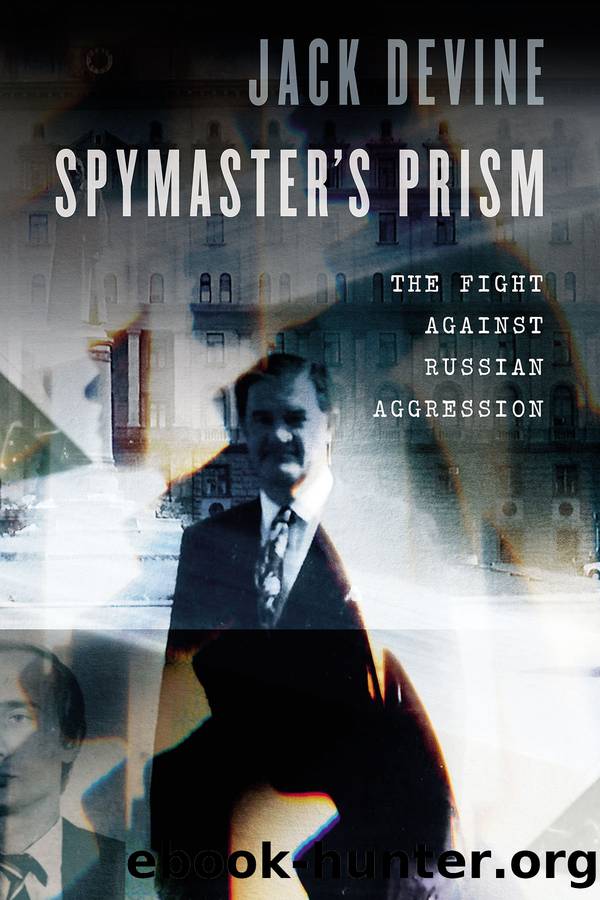Spymaster's Prism by Jack Devine

Author:Jack Devine [Devine, Jack]
Language: eng
Format: epub
Tags: POL012000 Political Science / Security (national & International), HIS036000 History / United States / General, HIS032000 History / Europe / Russia & The Former Soviet Union
Publisher: Potomac Books
Nuclear Advantage
The stories of Polyakov, Shevchenko, and Tolkachev highlight the value of intelligence in foreign affairs. It is this hard-to-collect information that, once vetted and analyzed, gives decision-makers the best possible insight into a given policy priority or issue. These assets provided the United States with extraordinary information that gave us a marked advantage in policy generally and at key moments in history. Most significantly, their information was pivotal in helping avert nuclear disaster on at least two occasions.
When misinterpreting events poses existential risks, well-placed spies can provide a great service to our decision-makers by clarifying the intentions and policies of our adversaries. This point may be best exemplified by the Cuban Missile Crisis. After our Bay of Pigs fiasco, First Secretary Nikita Khrushchev decided to provide conventional weapons to Cuba in a defensive posture. Sometime in 1962, however, during a large buildup of Soviet arms in Cuba, he decided to initiate Operation Anadyr, a secret plan to deploy offensive nuclear weapons, including thirty-six MRBMs and twenty-four IRBMs, and forty-two thousand troops to Cuba. There had been agent and defector reports within the community of Cuban emigrants that the Soviets were planning offensive missile sites in Cuba, but the CIA was not able to confirm these reports. The intelligence communityâs assessment at that time was that the Soviets had no imminent plans to send nuclear weapons to Cuba, as they had no appetite to provoke the United States and potentially risk confrontation at a higher level. Most analysts within the intelligence community saw the conventional arms support as a defensive strategy by the Soviets, but DCI John McCone feared a worst-case scenario when in October 1962 Soviet offensive missile sites were detected in Cuba. It became clear that Khrushchev had taken very bold and aggressive action that threatened a direct military confrontation with the United States.3
Operation Anadyr at first went undetected because of restrictions placed on reconnaissance flights in September, but photos of the missiles and the construction for launch sites were detected during the very first U-2 flight after restrictions (imposed after the Gary Powers U-2 incident) were lifted on October 14. The CIA was quickly able to confirm that there were SS-4 MRBMs present because Penkovskiy had provided the schematics and manuals for these specific nuclear missiles. It was Ray Cline, the deputy director for intelligence, who gave the news to the national security advisor, McGeorge Bundy, on October 15. The Kennedy administration went into high gear, simultaneously ordering preparations be made by the Joint Chiefs of Staff for a military invasion of Cuba, as well as for another attempt by the CIA to start a revolution. Thanks also to the information provided by Penkovskiy, the CIA was able to determine that the SS-4s were not yet operational, giving Kennedy extra time to craft his strong yet famously diplomatic response. On October 23 Kennedy imposed a naval âquarantine,â moved U.S. military readiness to DEFCON 3, and wrote a letter to Khrushchev demanding the removal of the missiles from Cuba.
Download
This site does not store any files on its server. We only index and link to content provided by other sites. Please contact the content providers to delete copyright contents if any and email us, we'll remove relevant links or contents immediately.
Blood and Oil by Bradley Hope(1558)
Wandering in Strange Lands by Morgan Jerkins(1419)
Ambition and Desire: The Dangerous Life of Josephine Bonaparte by Kate Williams(1386)
Daniel Holmes: A Memoir From Malta's Prison: From a cage, on a rock, in a puddle... by Daniel Holmes(1332)
Twelve Caesars by Mary Beard(1314)
It Was All a Lie by Stuart Stevens;(1295)
The First Conspiracy by Brad Meltzer & Josh Mensch(1167)
What Really Happened: The Death of Hitler by Robert J. Hutchinson(1161)
London in the Twentieth Century by Jerry White(1145)
The Japanese by Christopher Harding(1131)
Time of the Magicians by Wolfram Eilenberger(1125)
Twilight of the Gods by Ian W. Toll(1117)
Cleopatra by Alberto Angela(1094)
A Woman by Sibilla Aleramo(1092)
Lenin: A Biography by Robert Service(1074)
John (Penguin Monarchs) by Nicholas Vincent(1068)
The Devil You Know by Charles M. Blow(1024)
Reading for Life by Philip Davis(1023)
The Life of William Faulkner by Carl Rollyson(983)
